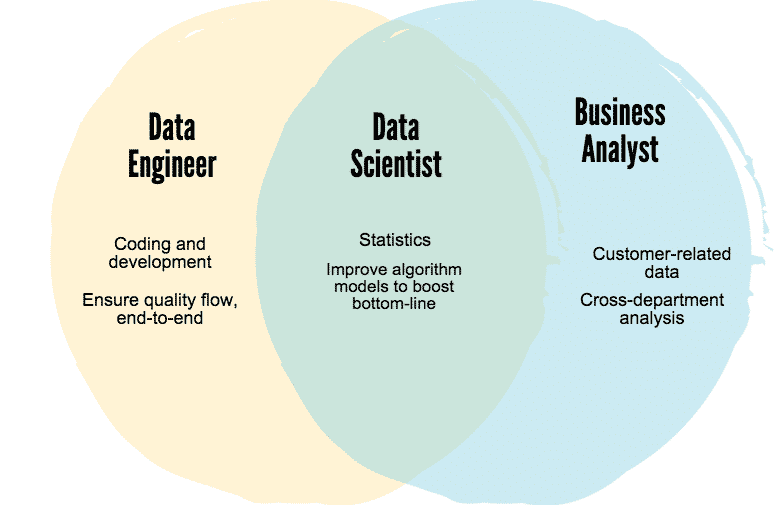The common misconception is that data analysts and data engineers’ roles are the same and can be used interchangeably. However, this is not true as each part differs in its own way. Data analysts and data engineers have their own unique responsibilities that set them apart. Read more information online to find out about the data analyst job description. The industry of data is booming and is set for expansion as more companies move online. This is one reason for the scope for data analysts and engineers being very promising. Growth in the market has led to high demand for both careers. In this field, companies look to hire specialized professions with specific industry knowledge. Understanding these roles’ job descriptions will help you choose the right career path or gain more knowledge about the industry.
What Differentiates Data Analysts and Data Engineers?
Data engineers use the Extract Data Load (ETL). The importance of ETL is that it empowers data engineers to create data warehouses while data analysts interpret information and draw conclusions. Data engineers store data and create algorithms, data analysts collate information and observe patterns, while data analysts perform preliminary quality checks on data to maintain quality and prepare reports to present to stakeholders. Data analysts remove inconsistencies and corrupt data. Data engineers prepare data for analytical purposes and are primarily concerned with data visualization and analyzing data. A data engineer may be a generalist, pipeline-centric, or database-centric, while a data analyst may be a business, database, or operations analyst, to name a few.
Unique Responsibilities Of A Data Analyst
Compared to a data engineer’s role, a data analyst’s job is less technical, although it requires a different skillset. Certain tools are standard in the industry and are essential to be aware of. Some such tools are –
SPSS SSAS Microsoft Excel SAS Miner
The common programming languages used by data analysts are Python, R, and SAS. Knowledge of SQL and Javascript are also highly sought after in the industry. Key responsibilities of a data analyst include –
Collecting and sorting through data Processing data and summarising results Logistic regression, linear regression, etc. Data visualization and reporting skills Organizing statistics and drawing conclusions
Data analysts are experts at absorbing data and making sense of it to answer burning questions that are faced by their companies. Understanding patterns and good data visualization skills are significant to be a good data analyst. Various industry dependant roles for a data analyst are –
Business Analyst Database Analyst Operations Analyst
Unique Responsibilities Of A Data Engineer
Data engineers are required to know most of the same coding languages as data analysts, but they must also have proficiency in working with frameworks like –
HIVE Apache Spark NoSQL Data Streaming Pig Hadoop
Data engineers are those that allow for data scientists and data analysts to perform optimally. The roles are not independent of each other. Rather, both need to work together to interpret and maximize value out of the data available. Due to the great importance of data in today’s world, the data engineer makes sure that the data is non-corrupt, interpretable, sorted, and accessible. Data engineers construct often use advanced tools to handle and process large amounts of data. They are more attuned to data interpretation and software development. A data engineer’s key responsibilities are –
Maintaining data architecture Data mining Transforming unusable data into a structured form for analysis Data queries Using Extra Transform Load (ETL) to form data warehouses
Performance optimization, data pipelining, and API creation and integration are all essential skills for a data engineer. It is the data engineer’s responsibility to enable data analysts to focus on solving data-related problems easily and quickly. Professional data engineers concentrate on maximizing efficiency and building. Some of their common responsibilities are –
Building APIs Working with existing pipelines to add datasets Testing and maintaining systems
Average Salaries of Data Analysts and Data Engineers
The average annual salary for a data engineer in the USA, according to Payscale is USD 92,317. The average bonus stands at USD 7,690. This is a commendable salary that would allow most engineers to live a comfortable life anywhere in the USA. Comparatively, the average annual salary for a data analyst in the USA is USD 60,981. The average bonus stands at USD 3,921, according to Payscale. This is a decent salary for an entry-level designation that is less technical but equally essential to a data-driven business. Both positions are advantageous and offer above-average salaries and bonuses. As the industry rapidly expands and new skills become important, salaries for both data engineers and data analysts are expected to follow an uptrend.
Conclusion
No matter which career you are interested in, whether it be a data analyst or a data engineer, both have great progress and growth opportunities. These roles are in-demand in today’s world, as more companies become data-driven and take their enterprise to the cloud. Data analysts and data engineers are essential to an information technology company that is serious about its data. While both roles may appear similar, they differ in responsibilities and skills required. Data analyst and data engineer are fast developing and expanding careers for promising professionals all around the world. As the industry grows at a rapid pace, more companies are looking to employ the skills of both data engineers and data analysts. Both careers are lucrative and can be highly rewarding for skilled professionals looking to earn a living working with data. Data analysts have varying responsibilities based on their level of experience. Job roles range from junior data analyst to senior data analyst. Since there can be many different responsibilities to be aware of, be sure to find out all the senior data analyst job description details. While data analysts provide value to a company by absorbing data and making sense of it using interpretation and data visualization skills, data engineers create and maintain databases holding important company information and manage access to this information as and when required.
